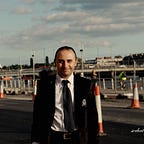From Beykoz to Tokyo
A journey with Erdoğan Güven on the Japanese education system, culture and philosophy…
My reason for starting this documentary project and river interviews has nothing to do with fishing. But I am very interested in fishing. It is not directly related to Japan, but I am very curious about Japan and its ancient culture. Seafaring is not a dominant element of this curiosity, but I love waves and fish.
This documentary project was created to shed light on a period of Turkey. The aim was to tell the sad transformation story of an institution that provided world-class education in Turkey’s 1970s. The school was first established under the name of Istanbul Fisheries and Aquaculture Art Institute and later became Istanbul Maritime and Aquaculture Vocational High School. Today, it continues education with a completely different system in the form of Beykoz Barbaros Hayrettin Paşa Vocational and Technical Anatolian High School.
The school, which first started its education life on October 1, 1973, under the auspices of President Fahri Korutürk, was established with the aim of training personnel who are active in the fields of maritime, shipping, aquaculture and food technology in our country, as well as in the utilization of our existing marine resources. It was decided to build it as a result of the negotiations held in 1967–1969 with the cooperation of the Turkish-Japanese Governments. Construction started in 1969 with the support of the Japanese aid agency JICA. From this date until 1979, Japanese experts came to Turkey. Many materials and equipment from the Aquaculture Department of Tokyo University were brought to the school and practical training opportunities were increased.
During its founding years, many students were sent from Turkey to Japan for education. A delegation of around 40 engineers from Japan came to Turkey and transferred knowledge and technology. This school experience, which was both international and intercultural, showed how important the enlightenment of science was in those years when Turkey surrendered to political chaos, but this voice could not be heard well and the project could not be developed to this day. It started great and progressed with great efforts, but due to reasons arising from political interests and conflicts, it changed, transformed and then evaporated in the 80s.
The precious teachers who took part in the establishment of Istanbul Maritime and Fisheries Vocational High School -the first maritime school of modern Turkey- also looked for other places and production opportunities in this social tsunami. Erdoğan Güven was one of the most important names in this story who was among the students sent to Japan, and after returning, transformed maritime education into a school, trained students with numerous projects, sent students to Japan, deepened Turkish-Japanese cultural and educational relations, and continued until today. We talked to him about the founding story of this school and his experiences during his stay in Japan. Moreover, we included Japanese culture, education and philosophy in this conversation.
Fisheries and Marine Scientist Nezih Bilecik had the following to say about Erdoğan Güven in his book titled “Those Who Marched Through the Field of Civilization Before the Seas Desertified and the Fish Extinct”, in which he wrote the history of this school. It would be useful to remember this once again.
I was greatly inspired by Erdoğan. Even though he is older, his mind is so young that I couldn’t believe it. He is still very active, reading, thinking, speaking and knowing the art of living inspired by the seas. He remembers the events of those years like it was yesterday. His memory is amazing. He took a lot of notes, took a lot of photos and videos, and was not just a spectator of what happened at that time, but played an active role in every process. As a sociologist as well as a marine and fish scientist, he explained the developments of the period to us with qualified observation and literary power. We are grateful to him.
Although Türkiye is surrounded by seas on three sides, it is one of the countries most unfamiliar with the knowledge of the seas. So much so that, although we have cultural exchange with historical ties, we are also strangers to the Japanese culture-education model.
We would be happy if this in-depth interview and the documentary we plan to make afterwards could serve as a hammer or a beacon that will help break these communal walls and illuminate these unknowns in these days when Turkey is in a chronic alienation from its environment, both geographically and biologically, as well as socially. At that time we will consider ourselves successful.
Erdoğan Güven reminded us that turning our face to the developed world and cultivating our lands by taking the knowledge, culture and philosophy from that world (ex. Japan) is a kind of recipe for getting rid of today’s political and social chaos, as it was in the 70s.
He has the say
